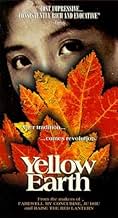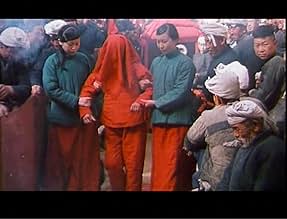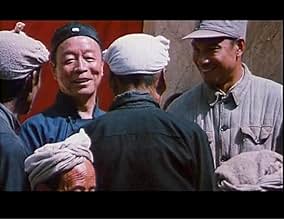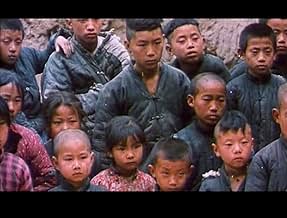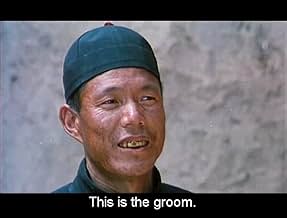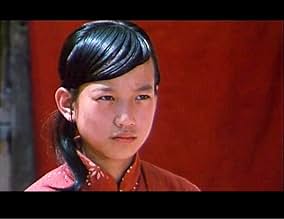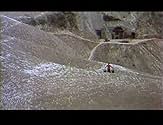NOTE IMDb
7,1/10
2,7 k
MA NOTE
Ajouter une intrigue dans votre langueA communist soldier travels to Shanbei to collect folk songs for propaganda while visiting a poor peasant family, giving hope to the teenage daughter in escaping an arranged marriage.A communist soldier travels to Shanbei to collect folk songs for propaganda while visiting a poor peasant family, giving hope to the teenage daughter in escaping an arranged marriage.A communist soldier travels to Shanbei to collect folk songs for propaganda while visiting a poor peasant family, giving hope to the teenage daughter in escaping an arranged marriage.
- Réalisation
- Scénario
- Casting principal
- Récompenses
- 8 victoires et 5 nominations au total
Avis à la une
This film is Chen Kaige's masterpiece. Although he would eventually direct the more financially successful Devil on the Doorstep (another great Kaige film), this one packs more emotional wallop. The cinematography is very impressive, and led to the emergence of Zhang Yimou as China's greatest filmmaker of all time in the later 80s and all of the 90. A picture is worth a thousand words, and this film shows why. The story unfolds because of images, not because of dialogue.
The only other films of great note before this one, that showed the effects of poverty in China were Spring in a Small Village and San Mao (Three Hairs). Most other Chinese films were filled with excessive CCP dialogue extolling the virtues of socialism. It is much better to show it than to speak it.
Gu Quing plays the CCP soldier who works as a propagandist for village folk song research, and Ba Xue plays the young girl, who is sold into indentured slavery by ancient Chinese cultural traditions. The soldier affects both her and her younger brother. I will not reveal the outcome of these relationships, as it would spoil your enjoyment of the film. One of the best 150 Chinese films ever made, and probably in the top ten.
Gu Quing - The Soldier(as Xueyin Wang) Bai Xue - The Young Farmgirl.
The only other films of great note before this one, that showed the effects of poverty in China were Spring in a Small Village and San Mao (Three Hairs). Most other Chinese films were filled with excessive CCP dialogue extolling the virtues of socialism. It is much better to show it than to speak it.
Gu Quing plays the CCP soldier who works as a propagandist for village folk song research, and Ba Xue plays the young girl, who is sold into indentured slavery by ancient Chinese cultural traditions. The soldier affects both her and her younger brother. I will not reveal the outcome of these relationships, as it would spoil your enjoyment of the film. One of the best 150 Chinese films ever made, and probably in the top ten.
Gu Quing - The Soldier(as Xueyin Wang) Bai Xue - The Young Farmgirl.
10mdworak
This movie is, to say the very least, a work of art. No other movie has ever evoked such emotional tears from my eyes as Yellow Earth. From the foreshadowing wedding ceremony, to the repetition in Cuigiao's own wedding, from distant silhouettes, to the ominous slow motion running of Hanhan during the ceremonial rain dance at the end, I have never felt the extent of sympathy for characters in a film as I have during and after viewing Yellow Earth. The folk songs reiterated the intensity of the sorrow through their text and solemn melodies. Ch'en Kaige beautifully crafted this film, bringing a little understanding of the plight of traditional China, and the revolutionary attempt to better their situation.
Ugh, this is a hard movie to watch. It is both boring and depressing -- and yet really good! How crazy that it works out that way. Maybe because it's a little TOO close to the experience of real life. Here we have a film that's a window into the life of Cuiqiao, and her tiny family of peasants, in a north-western province of China during World War II.
The music is a motif and the main thematic element of the film, expressing the misery most eloquently. The plot sees a lowly Communist officer trying to catalog or find folk songs for the Communist foot-soldiers to sing as morale-boosters. The best singer in town is the shy and depressed Cuiqiao whose life is pitiable. I won't go into details, but it is depressing for reasons that are equally social and economic. The officer seems nice, but he seems like another pawn in a bigger power game -- a guy who really isn't so sure of his faith in the party beyond a means of escape. He's just another guy staying one step ahead of the virulent poverty the main characters suffer through.
Seriously, the stuff is really affecting and memorable. The funny scene or two in this movie is all the more smile-inducing because you're just so glad for the break in the bleak atmosphere. And the songs -- mein gott, what grating stuff to spoiled western ears, but simultaneously so gut-wrenching! I'd call this a period piece, but the experiences of rural western villagers in China are probably pretty timeless. I mean, the landscape is certainly changing, but there are a lot of places that are still like this.
Watch it, you spoiled punks!
The music is a motif and the main thematic element of the film, expressing the misery most eloquently. The plot sees a lowly Communist officer trying to catalog or find folk songs for the Communist foot-soldiers to sing as morale-boosters. The best singer in town is the shy and depressed Cuiqiao whose life is pitiable. I won't go into details, but it is depressing for reasons that are equally social and economic. The officer seems nice, but he seems like another pawn in a bigger power game -- a guy who really isn't so sure of his faith in the party beyond a means of escape. He's just another guy staying one step ahead of the virulent poverty the main characters suffer through.
Seriously, the stuff is really affecting and memorable. The funny scene or two in this movie is all the more smile-inducing because you're just so glad for the break in the bleak atmosphere. And the songs -- mein gott, what grating stuff to spoiled western ears, but simultaneously so gut-wrenching! I'd call this a period piece, but the experiences of rural western villagers in China are probably pretty timeless. I mean, the landscape is certainly changing, but there are a lot of places that are still like this.
Watch it, you spoiled punks!
In this handsome but dramatically subdued portrait of life in the harsh, mountainous hinterland of mainland China a plucky young bureaucrat, collecting folk songs for the communist army, befriends a penniless widower and his children, before learning to his horror that the winsome teenage daughter is to be sold against her will into marriage with an elderly local farmer. Director Kaige Chen shows a photographer's eye for visual composition and symmetry, but the narrative structure of his film is almost non-existent. This is storytelling completely uninfluenced by Western techniques and standards, unfolding for the most part through imagery and song. Whether the result is a refreshing change of pace or an exercise in tedium will depend entire on the viewer's attitude toward classic Third World cinema.
10cameroj
My first viewing of this film was in a freshman seminar here at the University of Michigan aptly called "Chinese Cinema." Immediately after the viewing, my professor left the room and the majority of the class let out a syncronized moan. "I believe that was the worst film we've seen this far," he said. Never could he have been more wrong.
After viewing the film again and taking extensive notes for a paper on the film's earth/ sky imagery, I can say in objectivity that Yellow Earth is a landmark of not only Chinese, but Worldwide cinema. To those who would pay close attention, the film is a piece of art that is inexhaustible in its symbolism and technique. The film's cinematographer, the now very famous director Zhang Yimou, gives each frame its proper condition to the story. Every shot is composed with detail and beauty. The story is inextricably steeped in allegory, each character placed remarkably in relation to the others and to the landscape around them. This composition and the wonderful editing make this film a great cinematic achievement.
The key to the movie's wonder, however, is its ambiguities and its ambivalences. All the editing patterns, the quick cuts and the long stretches, and the masterful composition are strands that are woven as the viewer wills them to be. The ways to interpret everything this movies gives us are endless. Speculation on the film is a task never ending. If you can understand this and cherish the wonder that this film creates through its ambivalence, Yellow Earth is a pleasure with few peers. I recommend that every person interested in Chinese Cinema and classics of all foreign cinema watch this at least once.
After viewing the film again and taking extensive notes for a paper on the film's earth/ sky imagery, I can say in objectivity that Yellow Earth is a landmark of not only Chinese, but Worldwide cinema. To those who would pay close attention, the film is a piece of art that is inexhaustible in its symbolism and technique. The film's cinematographer, the now very famous director Zhang Yimou, gives each frame its proper condition to the story. Every shot is composed with detail and beauty. The story is inextricably steeped in allegory, each character placed remarkably in relation to the others and to the landscape around them. This composition and the wonderful editing make this film a great cinematic achievement.
The key to the movie's wonder, however, is its ambiguities and its ambivalences. All the editing patterns, the quick cuts and the long stretches, and the masterful composition are strands that are woven as the viewer wills them to be. The ways to interpret everything this movies gives us are endless. Speculation on the film is a task never ending. If you can understand this and cherish the wonder that this film creates through its ambivalence, Yellow Earth is a pleasure with few peers. I recommend that every person interested in Chinese Cinema and classics of all foreign cinema watch this at least once.
Le saviez-vous
- AnecdotesThe film was filmed near Yan'An, which is considered the motherland of the Chinese cultural revolution.
- ConnexionsFeatured in The Story of Film: An Odyssey: Fight the Power: Protest in Film (2011)
Meilleurs choix
Connectez-vous pour évaluer et suivre la liste de favoris afin de recevoir des recommandations personnalisées
- How long is Yellow Earth?Alimenté par Alexa
Détails
Contribuer à cette page
Suggérer une modification ou ajouter du contenu manquant

